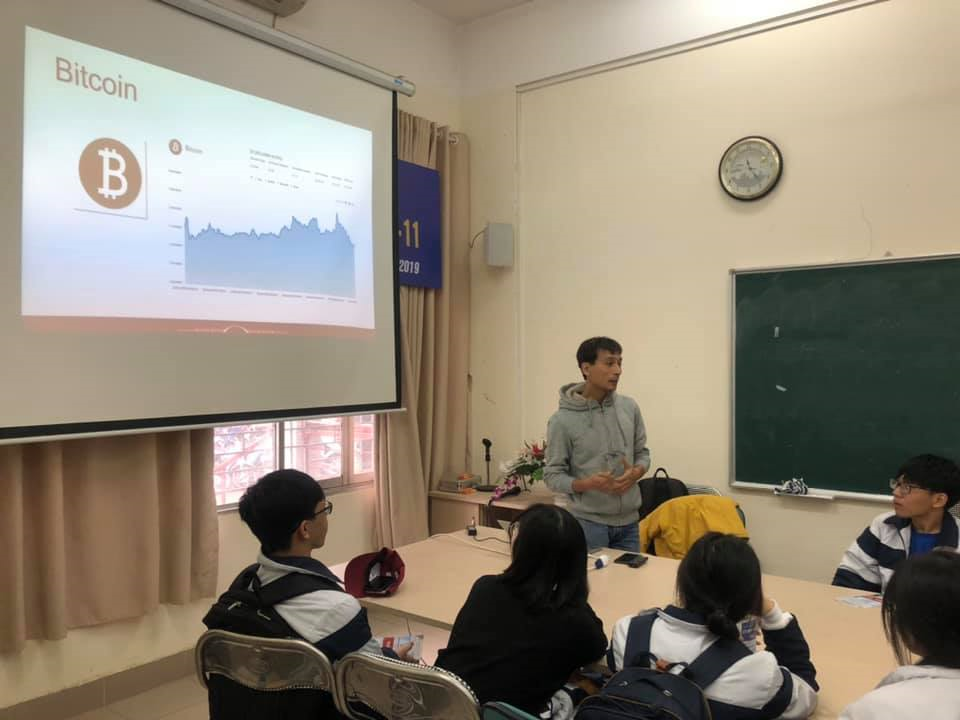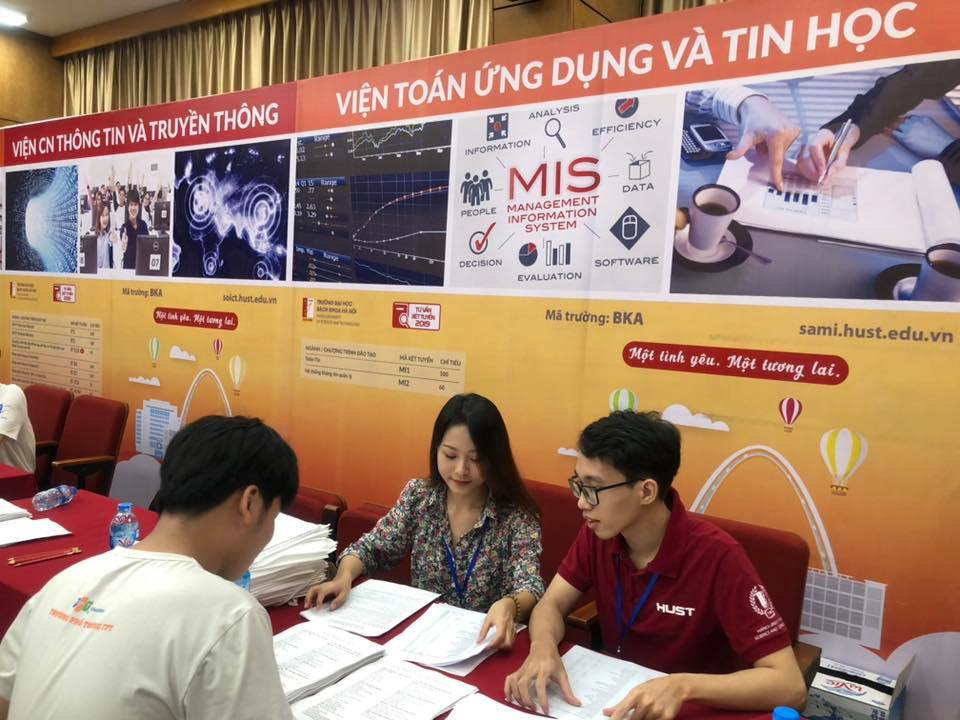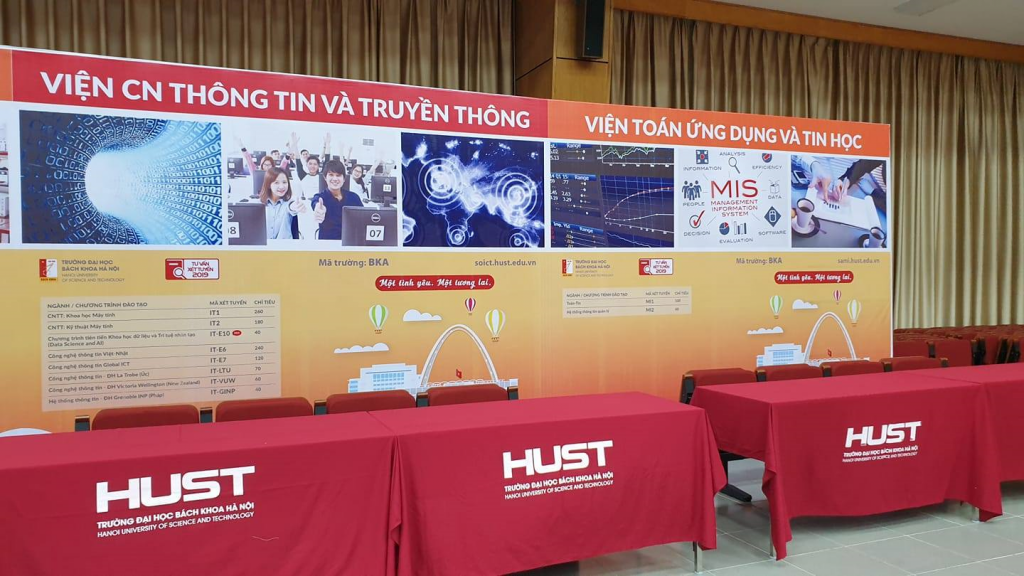EVIDENCE C. PROGRAMME SPECIFICATION
- Mathematics Informatics Programme Specification
- Popular the Mathematics Informatics Programme Specification
- On the website of HUST
- On the website of SAMI
- MI Program Flyer
- During the events such as: OPEN DAY, Welcome New Students
- Seminars/Meetings/Conferences
UNDERGTADUATE PROGRAMME
| Name of program: | Mathematics Informatics |
| Education level: | Bachelor |
| Major: | Mathematics Informatics |
| Program codes: | 7460117 |
| Duration: | 4 years |
| Degrees: | Bachelor in Mathematics Informatics |
| Credits in total: | 131 credits |
1. Program Goals
On successful completion of the Bachelor program, students will be able to:
- 1.1. Have a strong knowledge base, enough capacity to participate in solving problems related to the field of applied Mathematics and computer science (both in theory and application)
- 1.2. Have professional and personal skills and attributes including lifelong learning and self-study abilities to pursue higher levels of education to get adapted to the ongoing scientific and technological development.
- 1.3. Have communication, foreign language and teamwork skills to work in interdisciplinary, cross-cultural, and multinational environments.
- 1.4.Have abilities to conceive ideas, participate in designing, implementing and operating systems in enterprises and society.
2. Program Learning Outcomes
PLO1. Applying professional knowledge to be able to work efficiently in the field of mathematical applications to meet the requirements of modern society:
- 1.1. Ability to understand and apply basic knowledge of mathematics, computing and fundamental sciences.
- 1.2. The ability to adopt core knowledge expertise, adapt well to various tasks in the field of mathematics (describe, define, calculate and simulate systems, processes and software construction; research, analysis, construction solutions, process design…).
- 1.3. The ability to teach and research mathematics in universities, research institutes; Ability to continue the Graduate School of Mathematics and computing majors.
PLO2. Have professional skills and personal qualities needed to be able to succeed in career:
- 2.1. Ability to argue, analyze, synthesize, set problems and solve problems in theory and in action.
- 2.2. Systematic, logical, critical and reflective thinking.
- 2.3. Dynamic, creative, persistent and serious, ethical and professional responsibilities.
- 2.4. Ability to research, test and discover knowledge, self-study skills and adapt quickly to the development of science and technology and with life practices.
- 2.5. Have the political qualities, the consciousness of serving people, having health, meeting the requirements of building and protecting the country.
- 2.6. Understanding contemporary issues and lifelong consciousness.
PLO3. Social skills needed to work effectively in interdisciplinary, multi-cultural and multinational work environments:
- 3.1. Work independently and have teamwork skills.
- 3.2. Communicate effectively through writing, presenting, discussing, negotiating, and managing situations, using tools and means of modern information processing.
- 3.3. Good English proficiency at work with minimum TOEIC score of 500.
- 3.4. Understanding and respecting the working culture of agencies, organizations, and enterprises…
PLO4. Conceive ideas for the purpose of design, development and operation in enterprise and social settings, including:
- 4.1. Ability to detect, synthesize, analyze, and exploit social and economic issues in the country and abroad.
- 4.2. Understanding the environment and activities of organizations, financial institutions, domestic and international legislation.
- 4.3. Ability to build and develop projects, systems as well as deploy application solutions, products mathematical applications-computing on demand of economic and social organizations.
PLO5. Political qualities, conscious people’s service, health, meeting the requirements of building and protecting the country:
- 5.1. Political reasoning under the general provisions of the Ministry of Education and Training.
- 5.2. With the certificate of Physical Education and Certificate of Defence education-security under the general provisions of the Ministry of Education and Training.
3. Admission requirements
Baccalaureates admitted to the relevant specialized sector of Hanoi University of Science and Technology (HUST) will be enrolled in a 4-year program or 4 + 1.5-year programme.
Graduates of the “Bachelor in Mathematics Informatics” programme of HUST are optionally enrolled in the 1.5-year master programme.
Graduates from other Bachelor or Engineering programmes at HUST can enrol in the double- degree programme in accordance with HUST regulations on the second undergraduate programme.
Graduates of HUST or other universities can enrol in the second undergraduate program under the general regulations of the Ministry of Education and Training and specific regulations of HUST.
4. Training process, graduation conditions
The training process and graduation conditions apply the regulations on the University’s credit- based higher education training and vocational training. Students enrolled in the doubledegree programme must also follow the regulation on studying the second undergraduate programme of HUST.
5. Grading system
The grades (A, B, C, D, F) and the corresponding 4-point scale are used to evaluate the official learning outcomes. The 10-Point scale is used for the explicit score of each component of a course.
| 10-points systems | 4-point systems | |||||
| grade | points | |||||
| Pass grade | from | 9.5 | to | 10 | A+ | 4.0 |
| from | 8.5 | to | 9.4 | A | 4.0 | |
| from | 8.0 | to | 8.4 | B+ | 3.5 | |
| from | 7.0 | to | 7.9 | B | 3.0 | |
| from | 6.5 | to | 6.9 | C+ | 2.5 | |
| from | 5.5 | to | 6.4 | C | 2.0 | |
| from | 5.0 | to | 5.4 | D+ | 1.5 | |
| from | 4.0 | to | 4.9 | D | 1.0 | |
| Fail grade | < 4.0 | F | 0 | |||
6. Program Content
6.1. General Program Structure
| Professional component | Credit | Note |
| General Education | 51 | |
| Mathematics and basic sciences | 33 | Major oriented |
| Law and politics | 12 | in accordance with regulations of Vietnam Ministry of Education and Training |
| Physical Education/ Military Education Military Education is for Vietnamese student only. | – | |
| English | 6 | 02 basic English courses |
| Professional Education | 80 | |
| Basic and Core of Engineering | 47 (±2) | consist of at least 1÷3 projects |
| Soft skills | 9 | Include of 02 compulsory modules: Social/Start-up/other skill (6 credits);Technical Writing and Presentation (3 credits). |
| Elective Module | 16 | Elective module provides specialized knowledge oriented towards different concentrations. |
| Engineering Practicum | 2 | scheduled for third year or above |
| Bachelor Thesis | 6 | Topic must be relevant to major and knowledge gained during engineering practicum. |
| Total | 131 credits | |
6.2. Course list & Schedule
| No. | Course ID | Course Name | Credit | Semester | |||||||
| 1 | 2 | 3 | 4 | 5 | 6 | 7 | 8 | ||||
| Laws and politics | 12 | ||||||||||
| 1 | SSH1110 | Fundamental Principles of Marxism-Leninism I | 2(2-1-0-4) | 2 | |||||||
| 2 | SSH1120 | Fundamental Principles of Marxism-Leninism II | 3(2-1-0-6) | 3 | |||||||
| 3 | SSH1050 | Ho-Chi-Minh’s Thought | 2(2-0-0-4) | 2 | |||||||
| 4 | SSH1130 | Revolution Policy of Vietnamese Communist Party | 3(2-1-0-6) | 3 | |||||||
| 5 | EM1170 | General Law | 2(2-0-0-4) | 2 | |||||||
| Physical Education | 5 | ||||||||||
| 6 | PE1014 | Theory in Sport | 1(0-0-2-0) | ||||||||
| 7 | PE1024 | Swimming | 1(0-0-2-0) | ||||||||
| 8 | Elective courses | Elective course 1 | 1(0-0-2-0) | ||||||||
| 9 | Elective course 2 | 1(0-0-2-0) | |||||||||
| 10 | Elective course 3 | 1(0-0-2-0) | |||||||||
| Military Education | |||||||||||
| 11 | MIL1110 | Vietnam Communist Party’s Direction on the National Defense | 0(3-0-0-6) | ||||||||
| 12 | MIL1120 | Introduction to the National Defense | 0(3-0-0-6) | ||||||||
| 13 | MIL1130 | General Military Education | 0(3-0-2-8) | ||||||||
| English | 6 | ||||||||||
| 14 | FL1100 | English I | 3(0-6-0-6) | 3 | |||||||
| 15 | FL1101 | English II | 3(0-6-0-6) | 3 | |||||||
| Mathematics and basic sciences | 33 | ||||||||||
| 16 | MI1111 | Calculus I | 4(3-2-0-8) | 4 | |||||||
| 17 | MI1121 | Calculus II | 3(2-2-0-6) | 3 | |||||||
| 18 | MI1131 | Calculus III | 3(2-2-0-6) | 3 | |||||||
| 19 | MI1141 | Algebra | 4(3-2-0-8) | 4 | |||||||
| 20 | MI3030 | Probability and Statistics | 4(3-2-0-8) | 4 | |||||||
| 21 | PH1110 | Physics I | 3(2-1-1-6) | 3 | |||||||
| 22 | PH1120 | Physics II | 3(2-1-1-6) | 3 | |||||||
| 23 | IT1140 | Introduction to Computer Science | 4(3-1-1-8) | 4 | |||||||
| 24 | MI3010 | Discrete Mathematics | 3(3-1-0-6) | 3 | |||||||
| 25 | MI3041 | Numerical Analysis | 2(2-1-0-4) | 2 | |||||||
| Basic and Core of Engineering | 47 | ||||||||||
| 26 | MI2000 | Introduction to Mathematics Informatics | 3(2-0-2-6) | 3 | |||||||
| 27 | MI2150 | General Algebra | 2(2-1-0-4) | 2 | |||||||
| 28 | MI2060 | Fundamentals of Functional Analysis | 3(3-1-0-6) | 3 | |||||||
| 29 | MI3060 | Data structure and Algorithms | 3(3-1-0-6) | 3 | |||||||
| 30 | MI3090 | Database | 3(3-1-0-6) | 3 | |||||||
| 31 | MI3310 | Programming Skills | 2(2-0-1-4) | 2 | |||||||
| 32 | MI3380 | Project I | 3(0-0-6-6) | 3 | |||||||
| 33 | MI3370 | Operating Systems | 2(2-1-0-4) | 2 | |||||||
| 34 | MI3120 | System Analysis and Design | 3(2-2-0-6) | 3 | |||||||
| 35 | MI4060 | Computer Networks | 3(2-1-1-6) | 3 | |||||||
| 36 | MI3390 | Project II | 3(0-0-6-6) | 3 | |||||||
| 37 | MI3050 | Optimization Methods | 4(4-1-0-8) | 4 | |||||||
| 38 | MI3070 | Differential equations | 3(3-1-0-6) | 3 | |||||||
| 39 | MI4090 | Object oriented programming | 3(2-2-0-6) | 3 | |||||||
| 40 | MI3080 | Complex Analysis and Applications | 3(3-1-0-6) | 3 | |||||||
| 41 | MI3342 | Computer Architecture | 2(2-1-0-4) | 2 | |||||||
| 42 | MI3042 | Numerical Methods | 2(2-1-0-4) | 2 | |||||||
| Soft skills | 9 | ||||||||||
| 43 | EM1010 | Introduction to Management | 2(2-1-0-4) | 2 | |||||||
| 44 | EM1180 | Business Culture and Entrepreneurship | 2(2-1-0-4) | 2 | |||||||
| 45 | ED3280 | Applied Psychology | 2(1-2-0-4) | 2 | |||||||
| 46 | ED3220 | Soft Skills | 2(1-2-0-4) | 2 | |||||||
| 47 | MI2030 | Technical Writing and Presentation | 3(2-2-0-6) | 3 | |||||||
| Elective Module | |||||||||||
| Module: Calculations and Software Systems | 16 | ||||||||||
| 48 | MI4414 | Information Technology Project Management | 2(2-1-0-4) | 2 | |||||||
| 49 | MI4314 | Combinatorial optimizations | 2(2-1-0-4) | 2 | |||||||
| 50 | MI4104 | Security and Algorithm Complexity | 3(3-1-0-6) | 3 | |||||||
| 51 | MI4364 | Parallel computation | 2(2-1-0-4) | 2 | |||||||
| 52 | MI4374 | Network Design, Implementation and Administration | 2(2-0-1-4) | 2 | |||||||
| 53 | MI4382 | Computer Graphic | 3(3-1-0-6) | 3 | |||||||
| 54 | MI4214 | Data warehouse and business intelligence | 2(2-1-0-4) | 2 | |||||||
| Module: Smart Data Analysis | 16 | ||||||||||
| 55 | MI4024 | Data Analysis | 2(2-1-0-4) | 2 | |||||||
| 56 | MI4304 | Distributed Systems | 2(2-1-0-4) | 2 | |||||||
| 57 | MI4050 | Time series | 3(3-1-0-6) | 3 | |||||||
| 58 | MI4104 | Security and Algorithm Complexity | 3(3-0-1-6) | 3 | |||||||
| 59 | MI4216 | Decision Support Systems | 2(2-1-0-4) | 2 | |||||||
| 60 | MI4214 | Data warehouse and business intelligence | 2(2-1-0-4) | 2 | |||||||
| 61 | MI4364 | Parallel computation | 2(2-1-0-4) | 2 | |||||||
| Module: Scientific computing | 16 | ||||||||||
| 62 | MI4024 | Data Analysis | 2(2-1-0-4) | 2 | |||||||
| 63 | MI4162 | Introduction to Calculus and Programming | 2(2-0-1-4) | 2 | |||||||
| 64 | MI4314 | Combinatorial optimizations | 2(2-1-0-4) | 2 | |||||||
| 65 | MI4364 | Parallel computation | 2(2-1-0-4) | 2 | |||||||
| 66 | MI4032 | Mathematical Models in Economics | 2(2-1-0-4) | 2 | |||||||
| 67 | MI4084 | Finite Difference and Finite Element Methods | 3(3-1-0-6) | 3 | |||||||
| 68 | MI4050 | Time series | 3(3-1-0-6) | 3 | |||||||
| Module: Applications of Mathematic in Economic and Industry | 16 | ||||||||||
| 69 | MI4032 | Mathematical Models in Economics | 2(2-1-0-4) | 2 | |||||||
| 70 | MI4341 | Some mathematical methods in finance | 3(3-1-0-6) | 3 | |||||||
| 71 | MI4114 | Stochastic Simulations and Applications | 2(2-1-0-4) | 2 | |||||||
| 72 | MI4314 | Combinatorial optimizations | 2(2-1-0-4) | 2 | |||||||
| 73 | MI4024 | Data Analysis | 2(2-1-0-4) | 2 | |||||||
| 74 | MI4162 | Introduction to Calculus and Programming | 2(2-0-1-4) | 2 | |||||||
| 75 | MI4084 | Finite Difference and Finite Element Methods | 3(3-1-0-6) | 3 | |||||||
| Engineering Practicum and Bachelor Thesis | 8 | ||||||||||
| 73 | MI4800 | Engineering Practicum | 2(0-0-4-4) | 2 | |||||||
| 74 | MI4900 | Bachelor Thesis | 6(0-0-12-12) | 6 | |||||||
7. Date of issue and revision
The programme was firstly issue in 2009. A minor revise was done in 2013 when SAMI was allowed to put in experiment the Bachelor on Mathematics Informatics. In 2017, with Training programme development project in the 2017-2025 period, the MI programme has been re-born and used until today.
8. Popular the Mathematics Informatics Bacherlor Programme Specification
- On the website of HUST HANOI UNIVERSITY OF SCIENCE AND TECHNOLOGY (https://en.hust.edu.vn/standard-programs)
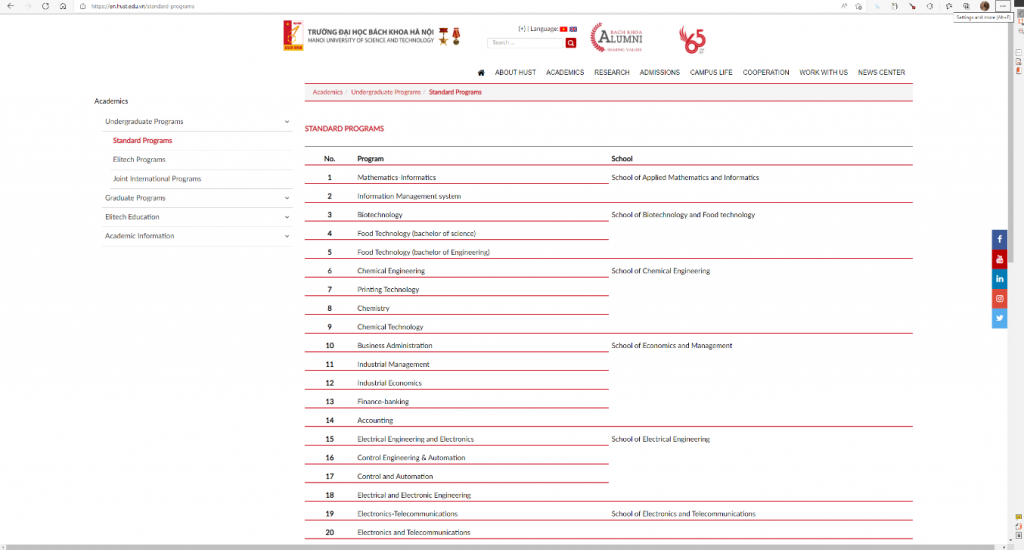
- On the website of Admission Office – HUST Toán – Tin (https://ts.hust.edu.vn/nganh-dao-tao/toan-tin)
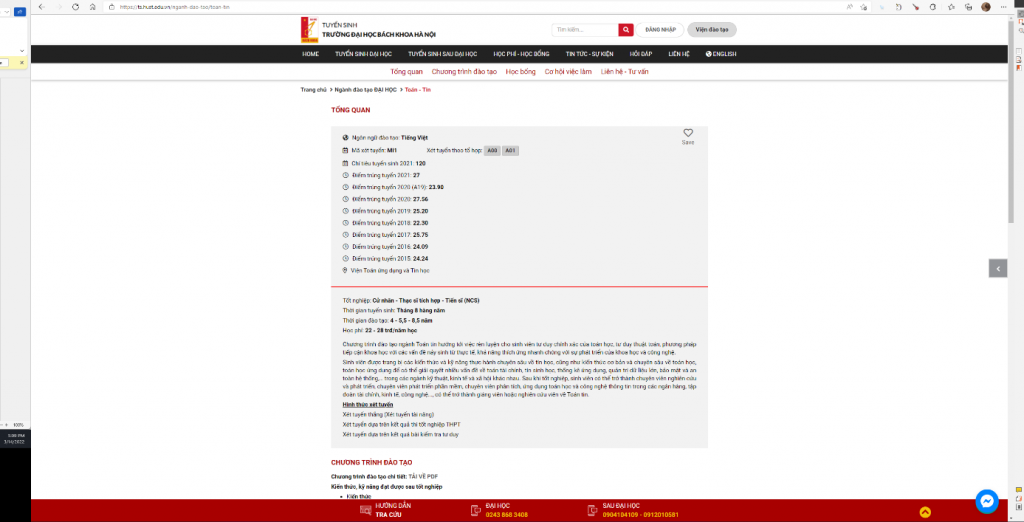
- On the wesite of SAMI
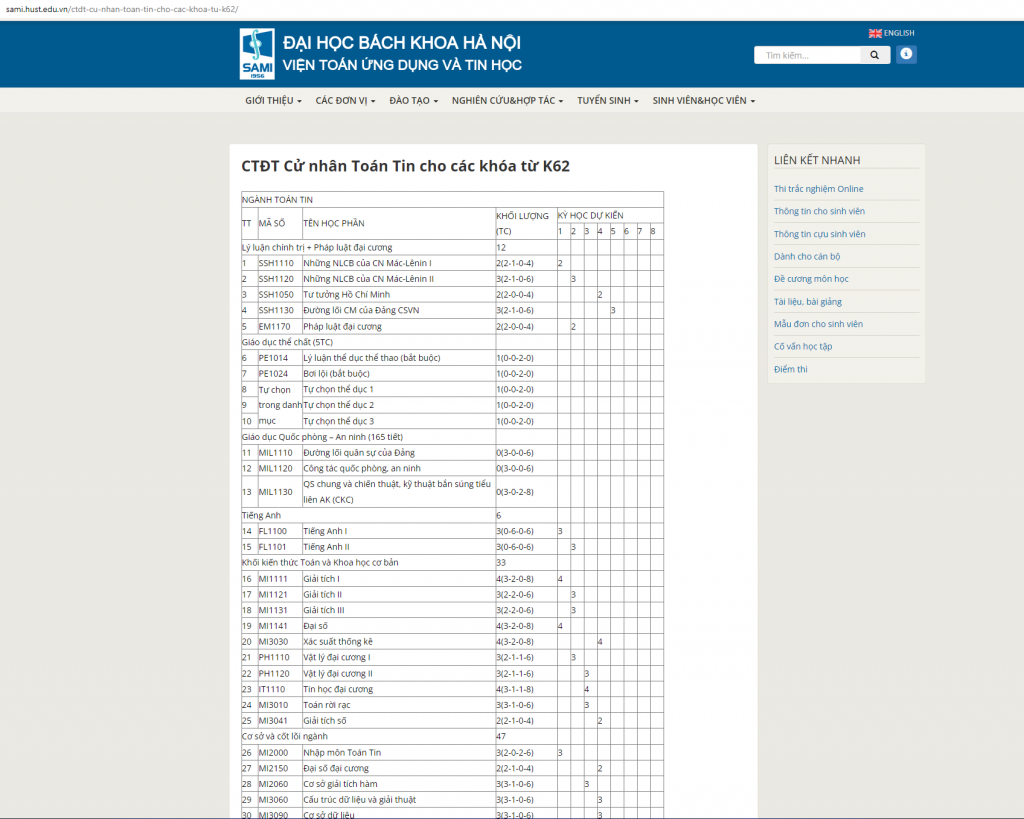
- MI Programe flyer
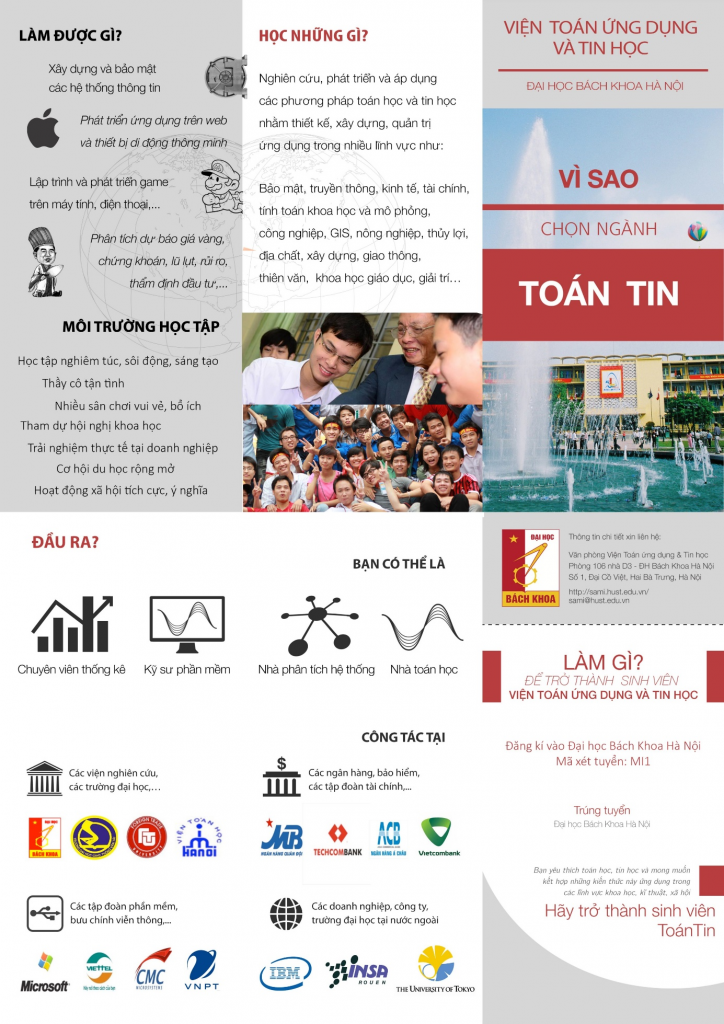
- During the events such as: OPEN DAY, Welcome New Students, Open Day
